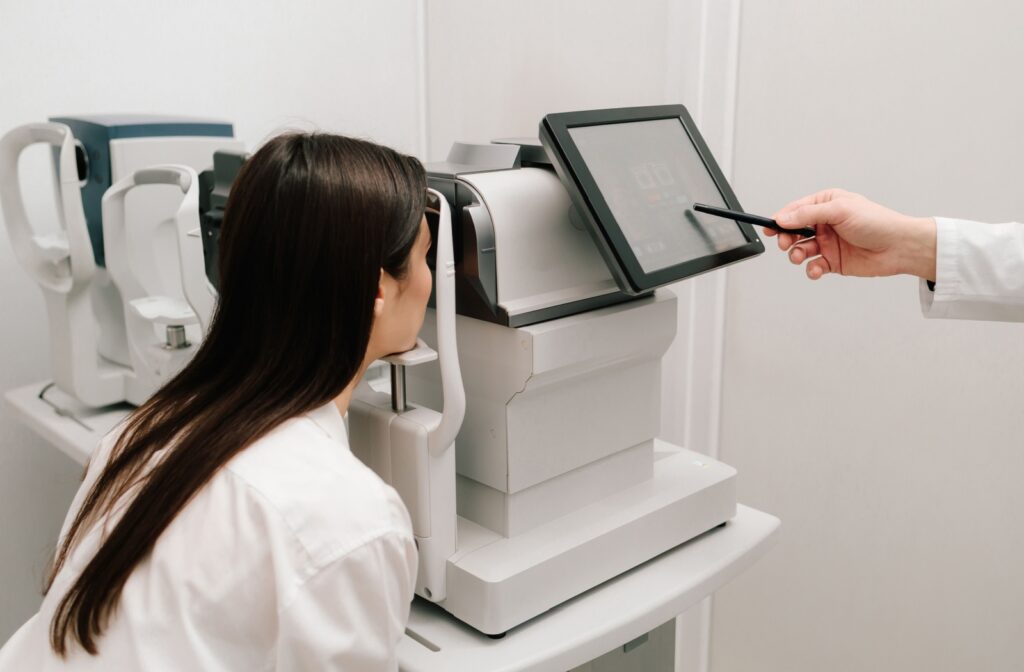Your eyes do more than just see the world around you; they are a key part of your overall health. Many people think an eye exam is just about checking if their glasses prescription has changed. While that’s part of it, a truly thorough exam from our practice looks much deeper into the health of your eyes and can even help detect other health conditions like diabetes.
An eye exam is an important part of your healthcare routine, just like a visit to your family doctor. A comprehensive eye exam is a complete evaluation of your vision and overall eye health, designed to detect eye diseases and other health issues. It goes far beyond a simple vision screening to give a full picture of how your eyes are working.
A Comprehensive Exam vs. a Routine Vision Screening
It’s easy to mix up a vision screening with a comprehensive eye exam, but they serve very different purposes. A vision screening is a quick check to see if you might have a vision problem. In contrast, a comprehensive exam is a detailed assessment performed by an eye doctor.
What a Vision Screening Checks
You might get a vision screening at school, work, or the DMV. These tests usually just check your distance vision, such as how well you can see things far away. They are helpful for spotting potential issues, but they don’t provide a diagnosis or check your eye health.
What a Comprehensive Exam Checks
A comprehensive exam is much more detailed. We assess your complete visual system and check for signs of common issues through eye disease diagnosis and management, including conditions like glaucoma, cataracts, and macular degeneration. We also evaluate how your eyes work together and determine an accurate prescription for glasses or contact lenses if you need them.
What to Expect During Your Eye Exam
Your visit includes several parts, and we make sure to explain each step along the way. Our goal is to get a full understanding of your vision and eye health. There are no surprises, just a careful, step-by-step evaluation.
Your Health & Vision History
We start with a conversation. We’ll ask about your general health, family health history, and any medications you take. We also want to know about your work, hobbies, and any vision symptoms you’ve noticed.
Vision & Eye Function Tests
Next, we perform several tests to evaluate different aspects of your sight. These tests help us understand how clearly you see and how your eyes function. The main tests include:
- Visual Acuity: This familiar test uses an eye chart to measure how clearly you see at various distances.
- Refraction Test: We use an instrument called a phoropter to find your precise prescription for clear, comfortable vision, which helps determine if you need glasses.
- Eye Teaming & Focus: We check how well your eyes work together to focus, track objects, and perceive depth. Poor eye teaming can sometimes be related to conditions like strabismus (crossed eyes).
Eye Health Evaluation
The final part of the exam is a close look at the physical structures of your eyes. We examine the front and inside of your eyes for any signs of health concerns. This helps us catch potential problems early on.
Does a Comprehensive Exam Include Dilation?
In some cases, we may recommend dilating your pupils as part of a comprehensive eye exam. This involves using special eye drops to temporarily widen the pupil: the black circle in the center of your eye. Dilation gives us a much better view of the structures inside.
Why Dilation Helps Your Eye Doctor
Think of your pupil as a window into your eye. When your pupils are wider, we can see much more of what’s behind them. Dilation allows for a clear view of your retina, optic nerve, and the blood vessels at the back of your eye, which is important for checkups like diabetic eye exams.
What to Expect After Dilation
After dilation, your vision will likely be blurry up close, and your eyes will be sensitive to light for a few hours. We recommend bringing a pair of sunglasses to wear on your way home. It’s also a good idea to have someone drive you to and from your appointment.
What Is a Digital Eye Exam?
A digital eye exam uses imaging tools to create a precise picture of your eye health. This is often an important part of your comprehensive exam.
Digital Retinal Imaging
This technology captures a high-resolution, wide-angle photo of your retina in order to give your eye doctor a detailed view of the back of your eye. Digital retinal imaging can provide enough detail to complement a dilated exam and sometimes reduce the need for dilation in certain situations.

How It Helps Track Your Eye Health
These digital images create a permanent and accurate record of your inner eye structures. Each year, we can compare new images to your previous ones. This helps us monitor your eyes for small changes over time that could signal the early stages of an eye disease.
How Often Should You Get an Eye Exam & Other Questions
Regular eye exams are a key part of staying healthy, but how often you need one can vary. We can help you determine the right schedule for your specific needs. Here are answers to a few common questions.
General Guidelines for Adults
For most adults, a comprehensive eye exam every one to two years is a good guideline. Your frequency may change based on your age, family history, and whether you wear glasses or contact lenses. We can recommend a schedule tailored for you.
Signs You Need an Exam Sooner
If you notice any changes in your vision, it’s a good idea to schedule a visit. Don’t wait for your next routine appointment if you experience any of the following:
- Sudden blurry vision
- Flashes of light or new floaters (which may indicate a medical emergency)
- Eye pain or redness
- Frequent headaches
- Difficulty seeing at night
How Long Do Comprehensive Eye Exams Take?
You can typically expect your exam to take between 60 and 90 minutes. This gives us plenty of time for a thorough evaluation and to answer all of your questions. We don’t rush through this important process.
Is a Comprehensive Eye Exam Covered by Insurance?
Your insurance coverage depends on your specific plan. Most vision insurance plans cover routine exams for glasses or contacts. If your exam is for a medical reason, such as monitoring an eye condition, your health insurance may also cover the visit.
Protect Your Vision
A comprehensive eye exam is about more than just a new prescription; it’s about protecting your long-term vision and health. By taking a complete look at your eyes, we can help you see clearly and comfortably for years to come. If you’re ready to schedule your next appointment, our team at Eye Care Center of Colorado Springs is here to help.


